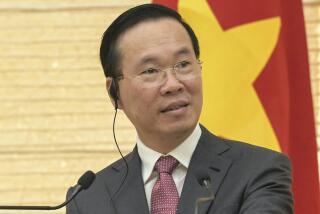China’s No. 2 Man Forced Out Over Student Protests : Premier to Take Reins of Party
- Share via
PEKING — Hu Yaobang, China’s second most powerful leader, was forced out today as head of the nation’s 44-million-member Communist Party after weeks of student turmoil and intellectual challenges to the socialist system.
The resignation of Hu, who acknowledged “mistakes” in dealing with the pro-democracy crisis, evidently was forced by top leader Deng Xiaoping, whom he had been widely expected to succeed.
Premier Zhao Ziyang, 67, who is considered less liberal than the 71-year-old Hu, was elected at the enlarged meeting of the ruling Politburo to succeed him as acting party chief.
It was not immediately clear whether Zhao would give up the premiership.
A Politburo statement read on television by an announcer in a light blue Mao suit--instead of the usual Western jacket and tie--said Hu “made a self-criticism of his mistakes on major issues of political principles in violation of the party’s principle of collective leadership.”
Participants in the meeting “gave Comrade Hu Yaobang a serious and comradely criticism and at the same time acknowledged his achievements,” it said, adding that Hu will retain membership in the Politburo and its Standing Committee.
50 Years a Party Member
The ouster ended weeks of speculation about Hu’s political future.
Hu has been a Communist Party member for nearly 50 years and took part in the 1934-35 Long March. But during Mao Tse-tung’s Cultural Revolution of 1966-76, Red Guards shaved his head and banished him to the countryside for 2 1/2 years.
He succeeded Mao’s handpicked successor, Hua Guofeng, as party chairman after Hua was driven out by Deng’s faction in 1981.
Chinese officials cited exhaustion from overwork as the reason Hu had not been seen in public for almost three weeks, but both Chinese and other sources said in recent days that he had lost favor with Deng and that his ouster was just a matter of time.
Student demonstrations began early in December, partly inspired by Deng’s own promises of more open government and other political reforms.
Deng has shown restraint toward the students but came down hard on intellectuals he has accused of inciting them by suggesting that Western capitalism and democracy are superior to communism.
‘Bourgeois Liberalization’
Hu, known for tolerance of social critics, appears to be the main victim of Deng’s campaign against “bourgeois liberalization,” a term synonymous with denial of communism and the party.
Deng and Hu have known each other for nearly 40 years and share the conviction that China can modernize only by shedding rigid leftist ideologies and opening up to the world. Hu had long been considered Deng’s likely successor as leader of China’s 1 billion people.
Even before the student troubles, however, Hu was said to face opposition in the military and had also alienated some conservatives with blunt criticisms of Mao’s policies.
Zhao and Deng have stressed in recent statements that the campaign against “bourgeois liberalization” will not affect economic reforms and the open-door policy.
Zhao earned his reputation as an economic reformer but is said to be more conservative on political issues than Hu. He has been premier six years.
If he holds both jobs, at least until a party congress next fall in which changes are expected in top party and government personnel, he will be the first to do so since Hua Guofeng.
More to Read
Sign up for Essential California
The most important California stories and recommendations in your inbox every morning.
You may occasionally receive promotional content from the Los Angeles Times.













